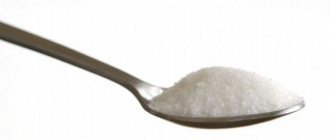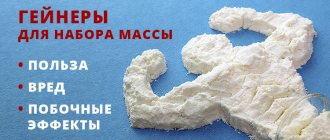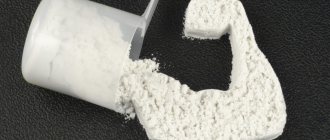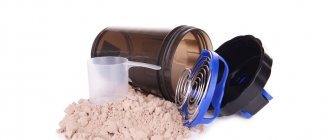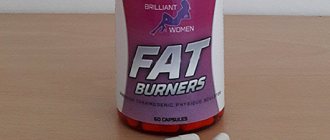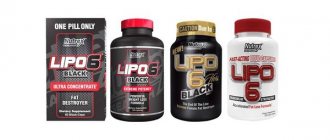The article will discuss what creatine monohydrate is, who should take it and how, what beneficial properties this substance has, and much more.
Creatine monohydrate is one of the most popular supplements among people looking to build muscle, improve performance, and increase strength.
Despite the fact that this substance is quite well studied, there is still a huge amount of misinformation about it. This guide contains only the facts about creatine monohydrate and is designed to answer all your questions.
If you have any comments or if anything is unclear, please leave comments below.
How does creatine work?
Creatine is the main source of ATP (the body's main energy substrate) in the short term during high intensity exercise. In the human body, creatine is present both in free form and in the form of creatine phosphate.
Creatine phosphate replenishes ATP stores in muscles when they contract rapidly. If muscle tissue runs out of creatine, it is unable to generate effort.
The use of creatine as an ergogenic aid is based on the theory that creatine reserves can be increased through supplementation. This is a very important point, which we will discuss below.
Why do you need creatine?
It is this substance that helps us cope with pain and physical discomfort. In addition, the element helps strengthen joints and tendons and replenishes energy.
Creatine consumption has an effect on:
- Strength and endurance . During heavy training, the body primarily turns to this source of energy. In this way, ATP and glycogen are saved, which increases strength indicators and allows you to quickly move on to increasing the load. Greater efficiency is observed in the example of short-term sports indicators.
- Muscle volume . With constant intake of creatine, muscles increase in size and become round due to the accumulation of fluid in the cells. In this case, an increase occurs exclusively in dry mass, without fat.
- Rate of recovery and growth of muscle tissue . The element improves the quality of the muscle nutritional environment, thereby providing a supply of glycogen and building material.
- Vessels . The use of this substance helps reduce cholesterol levels, which prevents the occurrence of myocardial infarction and other vascular diseases.
- Heart . Creatine naturally regulates the correct rhythm of contractions.
The supplement helps avoid muscle breakdown during drying. For weight loss, it can be used to increase the intensity of training. Otherwise, it is useless for fat burning. Despite the fact that the effect of the substance is associated with the production of testosterone, women are not prohibited from using it, however, the result is not as good as in men. Creatine is a natural source of energy that is not a dope, and therefore is also used in team sports.
Beneficial features
Creatine is one of the most widely researched supplements. More than 7,000 scientific articles are devoted to this topic. Hundreds of studies have proven the beneficial properties of creatine monohydrate, including:
- Increasing muscle creatine levels
- Increased performance and improved training performance
- Muscle growth
Below are detailed explanations of these properties.
Increased muscle cretin levels
In order to experience the benefits of creatine, you must replenish creatine stores in your skeletal muscles. According to recent studies, supplementation increases muscle creatine levels by 10-40%.
These results were observed after the so-called creatine loading. It involves taking the substance at a rate of approximately 0.3 g per 1 kg of body weight per day for 5-7 days and 3-5 g per day after the end of this period.
However, the practice of creatine cycling has not been shown to be very effective in maintaining elevated levels of this substance in the body.
Increased strength and performance
Creatine is currently considered the most effective legal supplement for improving anaerobic endurance and increasing lean body mass. About 70% of studies showed a significant increase in exercise capacity in people taking this substance.
In both the short and long term, creatine improves overall training performance, resulting in 5-15% increases in strength and performance. According to the results of almost all studies, proper consumption of supplements increases body weight by about 1-2 kg in the first week of creatine loading.
As the authoritative journal International Society of Sports Nutrition states, “The vast body of positive research on creatine suggests that it is the most effective supplement for building muscle mass and improving performance in high-intensity exercise.”
Creatine benefits and harms
Like any sports supplement, creatine has features that can be beneficial or harmful under certain conditions.
For those who want to lose weight and adhere to a certain diet, the use of this supplement will not bring much benefit, because weight gain usually occurs due to an increase in the intensity and effectiveness of training. When dieting, the goal is to lose weight, not gain weight, so in this case the use of creatine is unnecessary.
But there is an opposite opinion, which is based on the fact that creatine only increases “lean” muscle mass and does not cause the appearance of fat deposits. In addition, during a diet there may not be enough energy reserves, because... There is a decrease in daily caloric intake and here creatine will be very useful. By combining it with the use of protein and intense training, you can achieve good results in getting rid of fat deposits.
The harm of creatine lies only in some side effects that can be caused by individual intolerance to the components of the supplement, an overdose, or the characteristics of creatine itself, not related to external factors.
This supplement may be harmful if it is not combined correctly with other substances, such as simple sugars or vasoactive amino acids.
Benefits of creatine
The specific effect of creatine on the body is determined by individual characteristics, but there are a number of proven beneficial effects that this supplement has:
- Increased muscle mass. With consistent training and proper nutrition, creatine can help you gain two to five kilograms of muscle mass in just one month of use. Thanks to the increase in strength, a high impact on the muscles is achieved, due to which the active process of their growth is activated.
- Increased strength and endurance. During high-intensity training, muscle tissue needs ATP molecules, which release energy. The dietary supplement serves as a source of phosphocreatine, with the help of which ATP molecules are formed, so creatine significantly increases muscle strength.
- Relief of muscles. Creatine monohydrate increases the amount of water in the muscle cell, making it look more rounded and voluminous. When muscle cells increase in volume due to the process of hydration, protein synthesis increases and the process of protein breakdown decreases, which has a beneficial effect on muscle growth and an increase in their relief.
- Buffering of lactic acid. During intense strength training, muscles produce lactic acid, which causes a burning sensation while the muscles are working and slows down their recovery. Creatine has a beneficial effect on inhibiting the secretion of lactic acid and on muscle recovery after strength training.
In addition to the main positive effect that creatine has on the body, there are a number of additional beneficial properties from the use of this dietary supplement:
- Protects the central nervous system under conditions of oxygen deficiency.
- Reduces blood cholesterol levels.
- Prevents muscle atrophy and neuromuscular disorders.
- Can act as an anti-inflammatory agent for local or acute tissue inflammation.
Harm of creatine
Creatine is a safe dietary supplement and its harm can manifest itself in side effects, the incidence of which is quite low - about 4%.
Many studies have raised the question of whether creatine is harmful or not. As a result, this food additive was not found to be dangerous to health or cause irreversible harm to the human body. But, like any substance, creatine has its own characteristics that can cause some discomfort.
Side effects and harm of creatine to the body:
- Indigestion may occur due to the slow solubility of creatine, the crystals of which, if ingested, can cause gastrointestinal distress. It manifests itself as nausea, abdominal pain, and diarrhea. To prevent this effect, you should only take high-quality supplements or give preference to liquid or capsule forms of creatine, which are less effective.
- Water retention is an integral effect of creatine use. It does not harm the body, but only causes weight gain. If water retention occurs, you should not limit fluid intake or take diuretics, because this can cause the reverse process of dehydration (dehydration).
- Dehydration is due to the osmotic activity of creatine, due to which some of the liquid part of the blood can pass into the muscles. To prevent this effect, you should consume a large amount of fluid, which should reach three liters per day.
- Acne (pimples) may appear in athletes who have not reached puberty due to increased testosterone levels. After 23 years, this effect is almost completely eliminated.
Due to the existence of a negative opinion about sports nutrition in unenlightened sections of the population, there are a number of myths about the dangers of creatine, including:
- Addictive.
- Heart overload.
- Decreased potency.
- Increased blood pressure.
- Carcinogenic effects.
These effects are only speculation and have not been confirmed either in scientific studies or in reviews of people who use creatine.
How to take creatine correctly
As noted above, the purpose of taking creatine is to “saturate” the muscles with this substance. This effect can be achieved in a variety of ways, but loading seems to work best for quickly replenishing creatine stores as well as maintaining them. The dosage regimen should look like this: 0.3 g per 1 kg of body weight per day for 5-7 days and 3-5 g per day after this period.
What about the timing of taking creatine? Although it is often promoted as a pre-workout supplement, science does not support this view. Before delving into research, it’s enough to remember the very essence of creatine! It acts as an energy store, so one small dose before exercise will likely not sufficiently increase muscle mass to the extent needed to improve exercise performance.
Practice creatine loading and then maintain your creatine levels by consuming 3-5 grams per day. The timing of supplementation is not a significant factor.
In one study looking at the effect of timing of creatine supplementation on its effectiveness, 19 people were divided into 2 groups. The first took 5 grams of the substance before strength training, and the other after.
The first group showed improvements that were not observed in the second, but the differences were insignificant.
This suggests that the timing of supplementation is not a significant factor. You just need to practice creatine loading, and then go into a maintenance phase, consuming 3-5 grams per day.
What is creatine for?
When performing any movement, energy is consumed; it comes from ATP (Adenosine triphosphate) - a universal source of energy in the body. ATP in cells is always approximately the same amount; it cannot be increased, but it is possible to quickly restore costs. Creatine performs this function and helps maintain ATP levels. Thanks to creatine, strength endurance and the effectiveness of strength training increase.
For athletes
Creatine helps to withstand short loads at maximum intensity, so it is necessary for sprinters and strength athletes. Effective in combat and game sports with frequent accelerations: football, basketball, hockey, etc.
In endurance sports (for example, long-distance running), creatine is ineffective - it does not increase overall endurance. Supplementation of creatine by endurance athletes is justified if they need to increase muscle strength. During training camps with a lot of strength training, creatine will have a positive effect.
Vegetarians
Meat is the main source of natural creatine, and its lack is harmful to health. Therefore, vegetarians are advised to take small doses of creatine to maintain health.
In medicine
Creatine is used in medicine for the rehabilitation of patients who have been immobile for a long time.
Side effects
For years, the media has portrayed creatine as a dangerous and “obscure” supplement that can have negative health effects when taken long-term. Unfortunately, they came to these conclusions due to a lack of information.
Some of the most common accusations against creatine include dehydration, injury, digestive upset, and even kidney and liver damage. However, to date there are no controlled studies to prove this.
The only clinically identified side effect of creatine is weight gain (due to increased water concentration within cells), which is typically the goal of those who take it.
We can say that man began to consume creatine since he began to eat meat, and this happened, according to scientists, more than 1 million years ago. The research of the substance itself began more than 40 years ago, when it began to be used experimentally to treat heart diseases and improve heart function after a heart attack.
At the same time, unconfirmed information probably appeared that creatine can lead to stomach upset when taken in excessively large doses (20+ grams). However, taking the supplement with enough water or switching to higher quality brands will usually eliminate this side effect.
What is creatine monohydrate?
Creatine monohydrate is a naturally occurring organic compound that is converted into creatine phosphate in the body. Creatine phosphate promotes the synthesis of the energy substrate adenosine triphosphate (ATP). It is ATP that provides energy for muscle contractions and other intracellular processes.
The human body can synthesize a small amount of creatine on its own; some of the nutrient comes from food, in particular red meat and fatty fish. However, the carnitine content of food can be significantly reduced during cooking and cooking.
Creatine monohydrate supplements are products that contain the purest form of creatine; athletes often take them before and after training and/or along with other drugs, such as whey protein.
Forms of Creatine
First of all, it is worth noting that there are 2 forms of creatine: creatine monohydrate and creatine ethyl ester. Moreover, the first is much cheaper than the second. Creatine ethyl ester is often promoted as a more effective form due to increased bioavailability, however, these claims are not scientifically supported.
Both forms have been experimentally proven to increase creatine levels in muscles, but some studies suggest that creatine monohydrate may be more beneficial in this regard.
One way or another, creatine monohydrate and creatine ethyl ester are effective and very similar in their effects.
Discovery of Creatine
Creatine was first isolated in the first half of the 19th century, and at the beginning of the next century, scientific experiments were conducted proving that regular use of the substance increases muscle strength. At the same time, “phosphocreatine” was discovered - combined molecules of creatine and phosphate, which, when accumulated in the body, improve metabolism. The most effective form of creatine was recognized as its monohydrate - paired molecules of creatine and water.
The victorious march of creatine in sports began in 1992 after the publication of a study by Swedish doctor Eric Haltman. He has proven that taking 20 grams of creatine monohydrate daily increases muscle creatine content by 20%. A year later, an authoritative publication on sports medicine published an article about the effective use of creatine by Swedish athletes. Later studies showed that for results you do not need to take 20 grams of creatine, but 5-7 grams per day is enough. But the effectiveness of creatine has always been confirmed.
Since that time, creatine monohydrate has become a popular dietary supplement among athletes around the world. Creatine is not included in the list of prohibited doping substances, which means it can be used in any competition.
We recommend reading: What is protein and what is it for?
It is important to remember that creatine is not an essential supplement - it is produced in the body from amino acids (glycine, methionine, arginine), so there is no need to necessarily get your creatine intake from dietary supplements. In sports nutrition, creatine is obtained chemically in laboratories, but there is nothing wrong with that. The process that occurs in the body is reproduced in the laboratory and the same creatine is obtained, no less natural.
The best brands of creatine producers
- MUSCLETECH
Cell-Tech
- Calorie content: 180 kcal
- Creatine content: 7 g
- Carbohydrate content: 38 g
- DYMATIZE
Creatine Monohydrate
- Creatine content: 5000 mg
- NUTREX
Creatine Drive
- Creatine content: 5000 mg
- ATHLETIC EDGE
Creatine RT
- Calorie content: 5 kcal
- Creatine content: 5450 mg
- Carbohydrate content: 1 g
- PROSUPPS
Creatine
- Creatine content: 5000 mg

